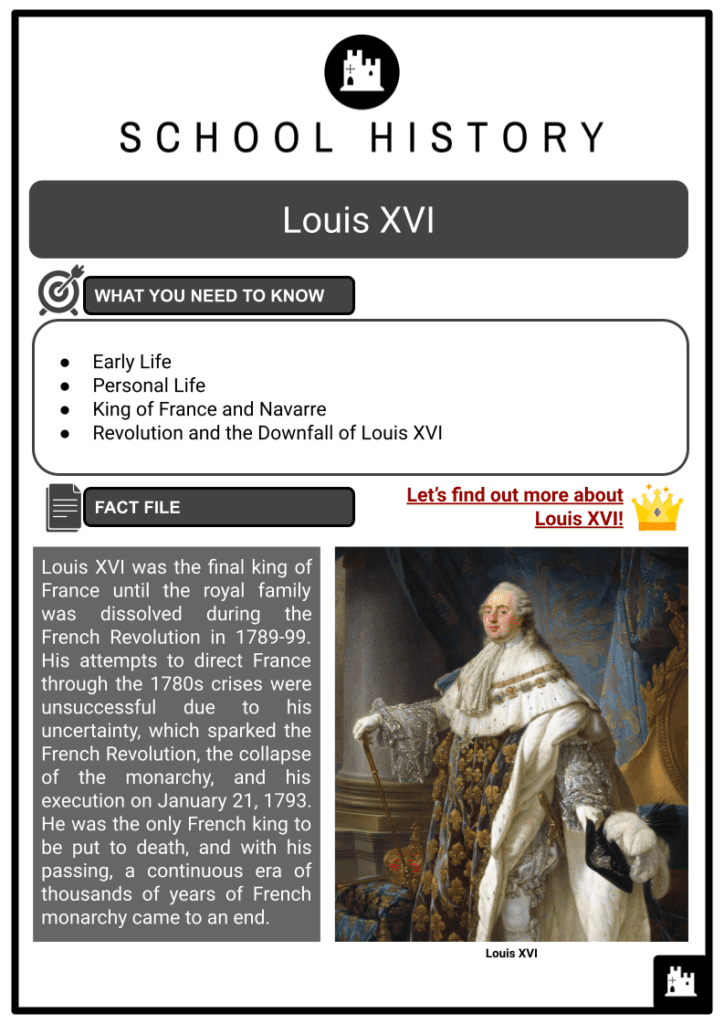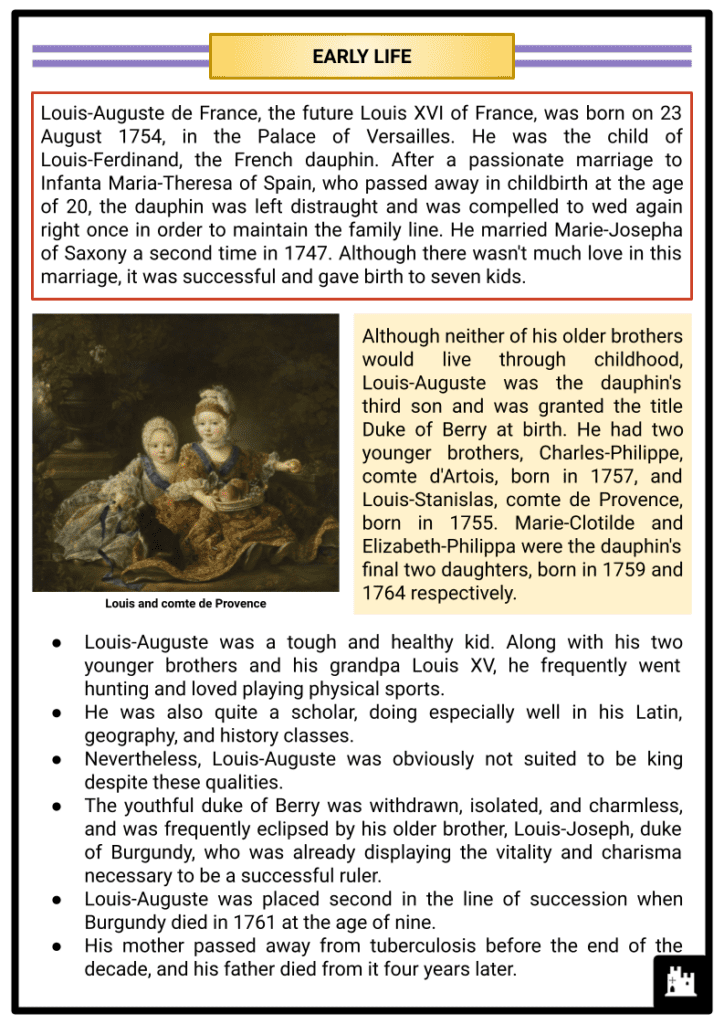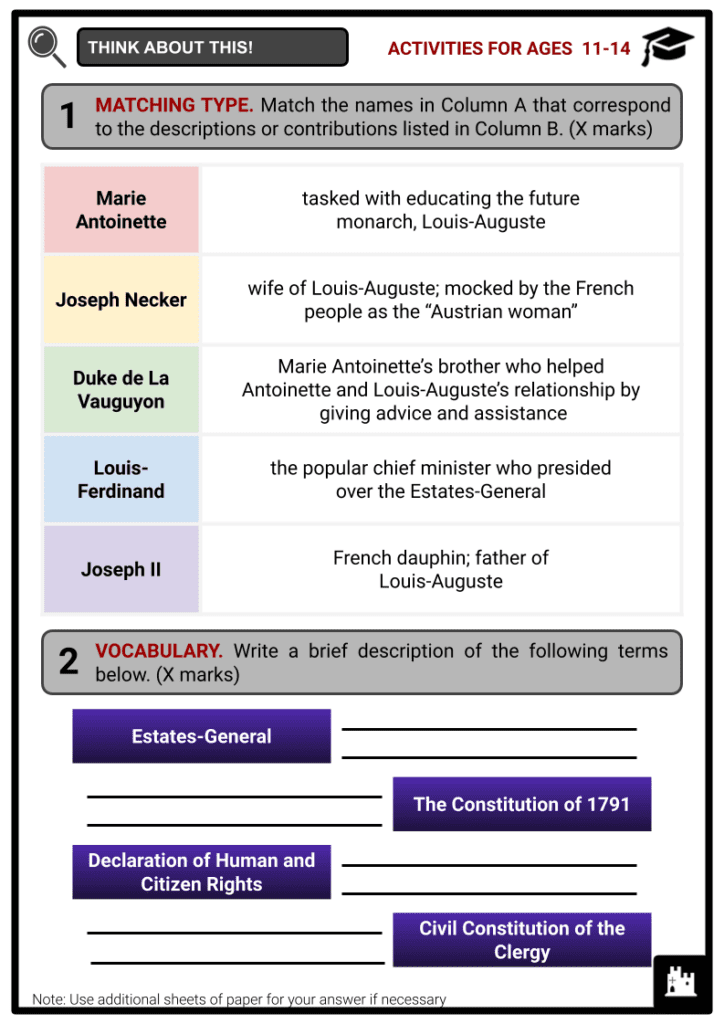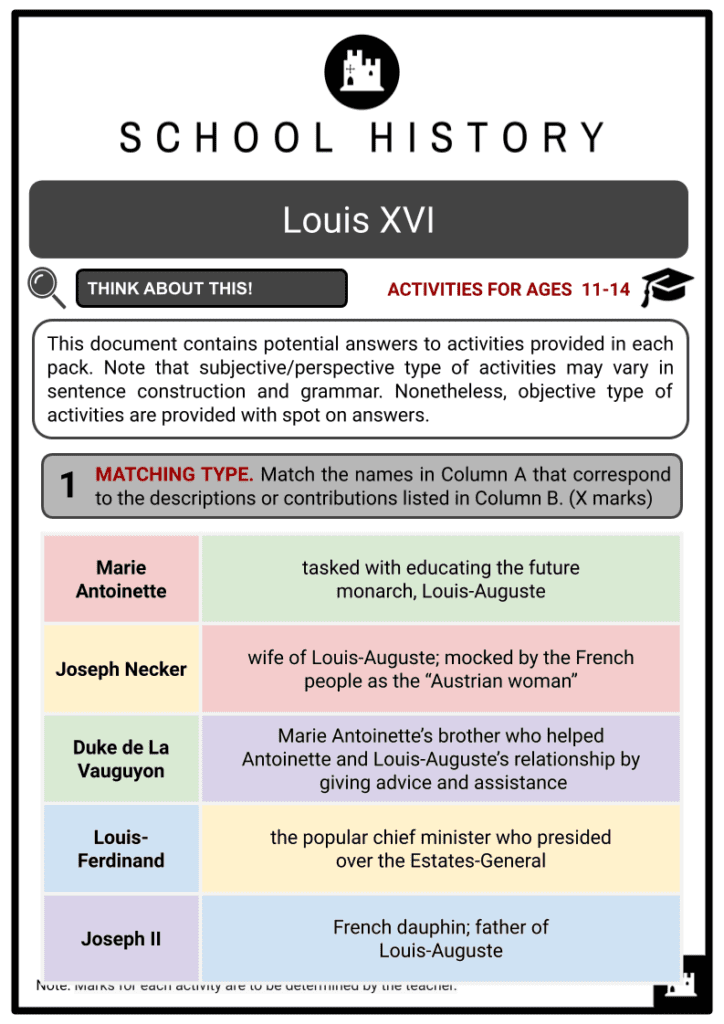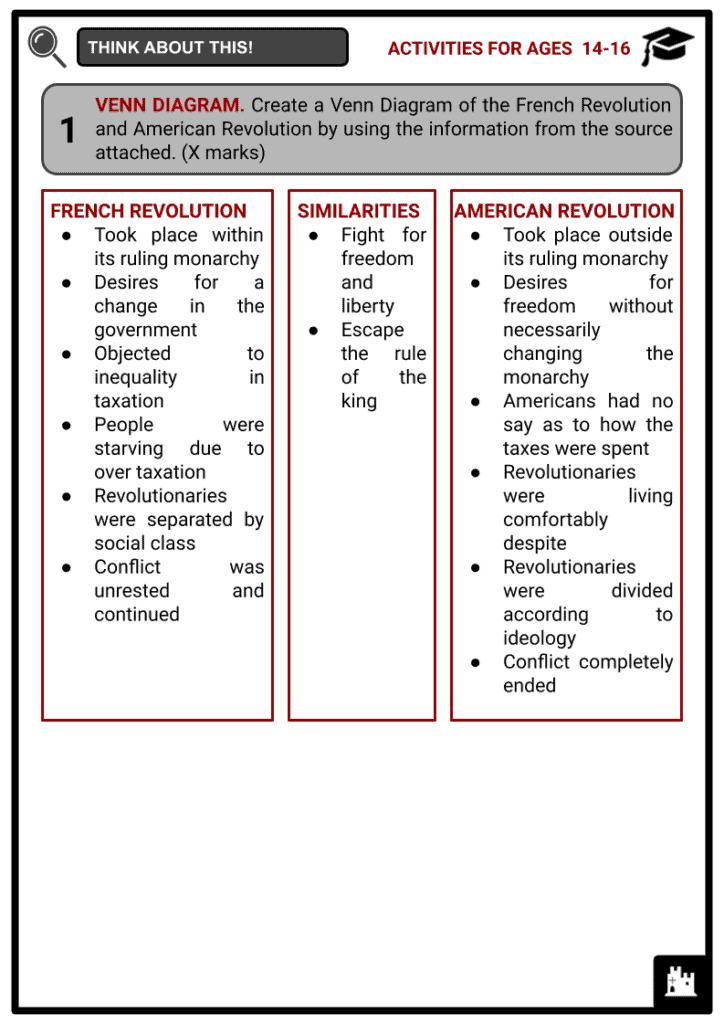Louis XVI Worksheets
Do you want to save dozens of hours in time? Get your evenings and weekends back? Be able to teach about Louis XVI to your students?
Our worksheet bundle includes a fact file and printable worksheets and student activities. Perfect for both the classroom and homeschooling!
Summary
- Early Life
- Personal Life
- King of France and Navarre
- Revolution and the Downfall of Louis XVI
Key Facts And Information
Let’s find out more about Louis XVI!
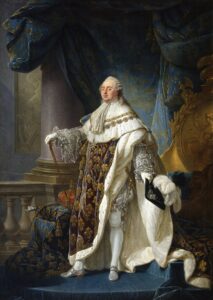
Louis XVI was the final king of France until the royal family was dissolved during the French Revolution in 1789-99. His attempts to direct France through the 1780s crises were unsuccessful due to his uncertainty, which sparked the French Revolution, the collapse of the monarchy, and his execution on January 21, 1793. He was the only French king to be put to death, and with his passing, a continuous era of thousands of years of French monarchy came to an end.
EARLY LIFE
- Louis-Auguste de France, the future Louis XVI of France, was born on 23 August 1754 in the Palace of Versailles. He was the child of Louis-Ferdinand, the French dauphin. After a passionate marriage to Infanta Maria-Theresa of Spain, who passed away in childbirth at the age of 20, the dauphin was left distraught and was compelled to wed again right once in order to maintain the family line. He married Marie-Josepha of Saxony a second time in 1747. Although there wasn't much love in this marriage, it was successful and gave birth to seven kids.
- Although neither of his older brothers would live through childhood, Louis-Auguste was the dauphin's third son and was granted the title Duke of Berry at birth. He had two younger brothers, Charles-Philippe, comte d'Artois, born in 1757, and Louis-Stanislas, comte de Provence, born in 1755. Marie-Clotilde and Elizabeth-Philippa were the dauphin's final two daughters, born in 1759 and 1764 respectively.
- Louis-Auguste was a tough and healthy kid. Along with his two younger brothers and his grandpa Louis XV, he frequently went hunting and loved playing physical sports.
- He was also quite a scholar, doing especially well in his Latin, geography, and history classes.
- Nevertheless, Louis-Auguste was obviously not suited to be king despite these qualities.
- The youthful duke of Berry was withdrawn, isolated, and charmless, and was frequently eclipsed by his older brother, Louis-Joseph, duke of Burgundy, who was already displaying the vitality and charisma necessary to be a successful ruler.
- Louis-Auguste was placed second in the line of succession when Burgundy died in 1761 at the age of nine.
- His mother passed away from tuberculosis before the end of the decade, and his father died from it four years later.
- Louis-Auguste, at eleven years old, received the title of dauphin upon his father's passing on 20 December 1765, making him the successor to the Kingdom of France.
- Duke de La Vauguyon was tasked with educating the future monarch in the absence of a father figure. Vauguyon was a stern and traditional teacher who focused mostly on teaching morals, religion, and the humanities, while failing to adapt the lectures to better fit France's successor.
- Given that Louis-Auguste was taught that timidity was a trait and that he should never show his genuine feelings or beliefs to others, some historians even blame Vauguyon's mentorship for the future king's indecision. This latter piece of counsel would be taken by Louis-Auguste, which would spark considerable discussion regarding his intellect and genuine views on the Revolution.
PERSONAL LIFE
- In order to fortify the newly formed Franco-Austrian relationship, Louis XV planned for his heir to wed Maria Antonia, the youngest child of the Habsburg Empress Maria Theresa, an Austrian archduchess. Two years later, on 16 May 1770, at Versailles, Louis-Auguste married his wife, who was 14 years old.
- Despite going by Marie Antoinette, the French people would not forget the new dauphine's foreign heritage and mocked her as "the Austrian woman." Still uncomfortable and timid, Louis-Auguste was either unable or unwilling to complete his marriage on his wedding day, a husbandly obligation he would not carry out for the following seven years.
- The young dauphin also sometimes acted rudely toward his wife, favouring lonely hunts or horseback excursions over her companionship. The absence of children would make Louis-Auguste laugh at the young couple and fuel suspicions about Marie Antoinette's sexual perversion and lack of religion, which would cause the young couple much distress and shame.
- Their marriage's lack of children has long been a source of controversy. Louis did not have phimosis, a physical ailment that would have prohibited intercourse, nor was he likely impotent, as was first assumed. Marie Antoinette, who was obviously eager to have children, was not at fault. According to historian François Furet, Louis XVI was afraid of being dominated and tricked by his wife in the same way that his grandfather had been manipulated by his numerous mistresses.
- Whatever the reason, the couple didn't get attached until 1777, when Marie Antoinette's brother Joseph II, Holy Roman Emperor, paid a covert visit to Paris. Since Louis and Marie Antoinette wrote to the emperor the next year to inform him of the queen's pregnancy and to thank him for his assistance, it suggested that Joseph's advice to the couple was helpful.
- Marie-Thérèse, Louis-Joseph, Louis- Charles, were the couple’s children and were born in 1778, 1781, and 1785, respectively.
- Sophie, the last daughter, would only live for 11 months and was born in 1787.
- These kids, whose births infused warmth and tenderness into their previously frigid marriage, were adored by Louis and his wife.
- Nonetheless, reputational harm had been done; Louis XVI became the punchline of jokes, and the queen was charged with adultery, with some even going so far as to assert that the royal children were not the king's.
KING OF FRANCE AND NAVARRE
- King Louis XV passed away on 10 May 1774, at the age of 64. Louis-Auguste, who was just 19 years old, became King of France and Navarre and Louis XVI. But in addition to inheriting his grandfather's realm, Louis XVI also had to deal with the Ancien Régime's structural problems, such as the vast state debt. The Flour War, a large wave of bread riots that followed Louis' ceremonial coronation at Reims in June 1775, was a foreshadowing of things to come.
- France required the direction of a strong and reliable leader, which Louis XVI was not because the problems the country was experiencing were serious. Young and naïve when he ascended to the throne, he lacked both social graces and self-assurance. He was already a big, sluggish, nearsighted man who liked to eat and drink excessively. Even in his daily private writings, which resembled ledgers more than anything else, he rarely expressed his genuine sentiments.
- His downfall generally resulted from the things he cared the most about. He would, for instance, have a tremendous desire to gain the affection of his people in the early years of his reign. He did this by overturning the critical choice made by his grandfather's chancellor, René Maupeou, and giving the 13 parlements, or courts, back their authority. Louis XVI would later realise that this choice was wrong. However, he seemed to think that making the concession was worthwhile in order to win his people over.
- When Louis XVI made the decision to support Great Britain's 13 insurgent colonies in North America in 1778, he once more paid attention to popular opinion.
- He was persuaded by a group of hawkish advisors that France's participation in the American Revolution would humiliate Great Britain and restore France's reputation, which had been damaged by its defeat in the Seven Years' War.
- People who idealised America and its struggle enjoyed the war as well. In March 1778, Louis' administration formally declared war on Great Britain.
- Although the military effort finally succeeded, it further increased the already enormous mountain of state debt, and the American triumph further alienated many Frenchmen from the concept of a tyrannical monarchy.
REVOLUTION AND THE DOWNFALL OF LOUIS XVI
- The financial crisis was hard to ignore by the 1780s. Louis' ministers were prevented from drafting a list of financial changes by the parlements, who saw a chance to reclaim part of their power. As the public called for an Estates-General, the gathering of the three pre-revolutionary estates, the Revolt of the Parlements in 1788 contributed to the escalating social unrest and financial hardship in France (clergy, nobles, commons). Louis XVI was forced to comply by August.
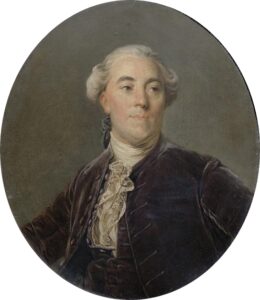
Jacques Necker - The popular chief minister, Jacques Necker, presided over the Estates-General of 1789, which convened at Versailles on May 5. The meeting, however, was quickly derailed because the Third Estate, which was aware that it would always lose to the higher estates, refused to call the vote until it was guaranteed that the three estates would not vote separately.
- Louis XVI insisted that the estates be resolved quickly since they were dragging on. However, he was distracted when his seven-year-old son and heir, Louis-Joseph, passed unexpectedly on June 4th. The Third Estate established itself as a National Assembly and declared all current levies to be unlawful while Louis remained preoccupied. Members of the Assembly swore the Tennis Court Oath after a string of misunderstandings, promising to remain together until they had given France a new constitution. The Revolution was under motion.
- Louis XVI made the decision to take action when he felt his strength slipping through his fingers.
- He sacked the royal officials he believed to be sympathetic to the insurgents and sent 30,000 soldiers into the Paris Basin.
- One of them was Necker, whose firing on 11 July was unacceptably harsh for the populace.
- A force of Parisian commoners seized the Bastille, a prison stronghold that stood for the authority of the French monarchy, on 11 July.
- Following the fall of the Bastille, Louis backed down, reinstating Necker and directing the army to leave Paris before addressing the populace from atop a balcony to demonstrate his seeming support to the revolutionaries' objectives. Other royalists were more alarmed by the Bastille storming; on 16 July, Louis' brother Artois and a group of allies left France.
- The Ancien Régime must be overthrown in order to create a new society founded on liberty, equality, and fraternity, according to the National Assembly. It drafted the August Decrees on the evening of August 4th; a few weeks later, it approved the Declaration of Human and Citizen Rights, which assured citizens' natural rights; and in July 1790, it approved the Civil Constitution of the Clergy, which subordinated the French Catholic Church to the will of the state.
- All three of these orders were approved by Louis XVI, even against his will. Thousands of Parisian market women and National Guardsmen attacked the Palace of Versailles when he attempted to reject the first two, forcing Louis and his family to flee to Paris where they were held as hostages at the Tuileries Palace on false pretenses. Even the hesitant Louis could see that something needed to be done as the Revolution became more extreme and his authority as the only king began to decline.
- Louis and his family made an effort to flee the Tuileries on the night of June 20-21 in 1791.
- The king's attempt to flee to Varennes was unsuccessful; even though he was disguised, Louis was identified by his likeness on a 50-livre assignat and was led by the National Guard back to Paris.
- This marked a turning point in the Revolution because, up until this point, the monarch was widely seen as a good ruler who was only being duped by his dishonest ministers.
- Now that he had left behind a declaration denouncing the Revolution, its objectives, and the constitution, it was obvious that he personally was against it.
- As more and more people demanded his ouster and cried out for the establishment of a republic, there would be no turning back.
- Louis' situation deteriorated during the course of the fall and winter of 1791. He agreed to the Constitution of 1791 in September, changing his formal title from the absolutist "King of France and Navarre" to the constitutional monarchist "King of the French." When he and Marie Antoinette were imprisoned in the Tuileries, his brothers Artois and Provence were organising an army of emigrants and Marie Antoinette's brother, Austrian emperor Leopold II, was turning more and more against the Revolution.
- They continued to search for help abroad while they were in this situation. The French Revolutionary Wars began in April 1792 when France prematurely declared war on Austria and Prussia as a result of rising tensions. Marie Antoinette and Louis Antoinette hoped that the Austrians would succeed and take back control.
- This would be a pointless hope. Parisians attacked the Tuileries Palace on 10 August 1792, out of concern that a foreign army would annihilate the city.
- Three days later, Louis XVI was formally taken into custody and put in the Temple, the prison stronghold where he would spend the rest of his life, along with his family.
- The Assembly proclaimed France to be a republic on September 21st, and as a result, Louis would henceforth be known simply as Citizen Louis Capet. Citizen Capet was tried for treason in December and declared guilty in January 1793 as a result of his private correspondence found in an iron box. The Assembly chose to execute Louis right away; Louis' own relative was one among the supporters of the death penalty.
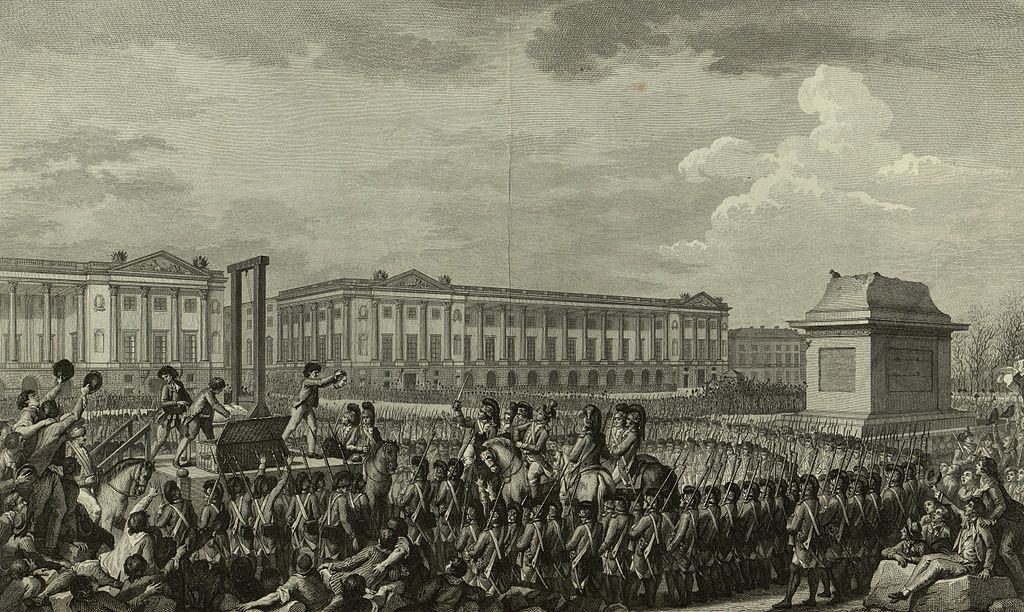
Execution of Louis XVI - On the evening of January 20th, Louis bid his wife and children farewell while assuring a grieving Marie Antoinette that he would return the next morning. He couldn't bring himself to honour the commitment. The former king asked his valet to deliver his wedding ring to the queen and the royal signet to his son when he received communion on the morning of January 21st at 6 a.m. "I die innocent of all crimes of which I have been charged. I pardon those who have brought about my death. I pray that the blood you are about to shed may never be required of France...", he attempted to say as he was carried to the scaffold in the Place de la Revolution.
- The remainder of his remarks was silenced by an abrupt drum roll. Louis was then forced forward beneath the guillotine's blade while being secured to a board. The head was severed after it had fallen, and the executioner hoisted it to show it to the jubilant throng as they dipped paper and ribbons in the royal blood as mementos. The 38-year-old king's death was a significant turning point in the American Revolution and the subsequent conflicts.
Image Sources
- https://en.wikipedia.org/wiki/Louis_XVI#/media/File:Antoine-Fran%C3%A7ois_Callet_-_Louis_XVI,_roi_de_France_et_de_Navarre_(1754-1793),_rev%C3%AAtu_du_grand_costume_royal_en_1779_-_Google_Art_Project.jpg
- https://en.wikipedia.org/wiki/Jacques_Necker#/media/File:Necker,_Jacques_-_Duplessis.jpg
- https://en.wikipedia.org/wiki/Execution_of_Louis_XVI#/media/File:Execution_of_Louis_XVI.jpg

